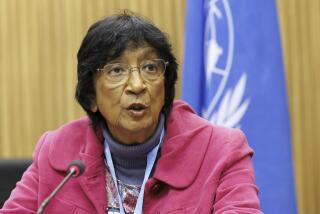Rights Group Cautions Against U.S. Siding With Afghans Tied to Abuses
- Share via
Several commanders within Afghanistan’s opposition forces committed “serious” human rights abuses in the 1990s, and the United States should avoid using them in its anticipated conflict with the Taliban regime, a human rights group said Saturday.
“The U.S. and its allies should not cooperate with commanders whose record of brutality raises questions about their legitimacy inside Afghanistan,” said Sidney Jones, executive director of the Asia division of Human Rights Watch in New York. “Any country that gives assistance to the Afghan opposition must take responsibility for how this assistance is used.”
Abuses by members of the Northern Alliance, also known as the United Front, from 1992 to 2000 include summary executions, rapes, burning of homes, looting and attacks on civilians, Human Rights Watch said in a report.
The watchdog group cited several incidents that it blamed on factions within the coalition of forces fighting the Taliban. Among them were executions, home burnings and looting in Sangcharak in late 1999 and early 2000; rocket attacks that killed civilians in Kabul, the capital, in 1998; summary executions of an estimated 3,000 Taliban soldiers in Mazar-i-Sharif in 1997; and reports of rampages, including widespread rapes, in Kabul in 1995 and 1993.
The human rights activists Saturday called on the United States, Russia, Iran and other nations to refrain from aiding opposition Afghan factions that include those who have abused human rights and to make aid conditional on respecting international codes of behavior.
They said U.S. officials should refrain from working with Abdul Rashid Dostum, head of an Uzbek militia known as the Junbish; Haji Muhammad Muhaqqiq, senior commander of the Hizb-i Wahdat, the Islamic Unity Party of Afghanistan; Abdul Rasul Sayyaf, whose group was known as the Islamic Union for the Liberation of Afghanistan; and Abdul Malik Pahlawan, a former Junbish senior commander.
“Not a single Afghan commander has been held accountable for human rights abuses,” Jones said. “The time to break this cycle of impunity is now, and the United States and its allies will have the leverage to do it.”
More to Read
Sign up for Essential California
The most important California stories and recommendations in your inbox every morning.
You may occasionally receive promotional content from the Los Angeles Times.













